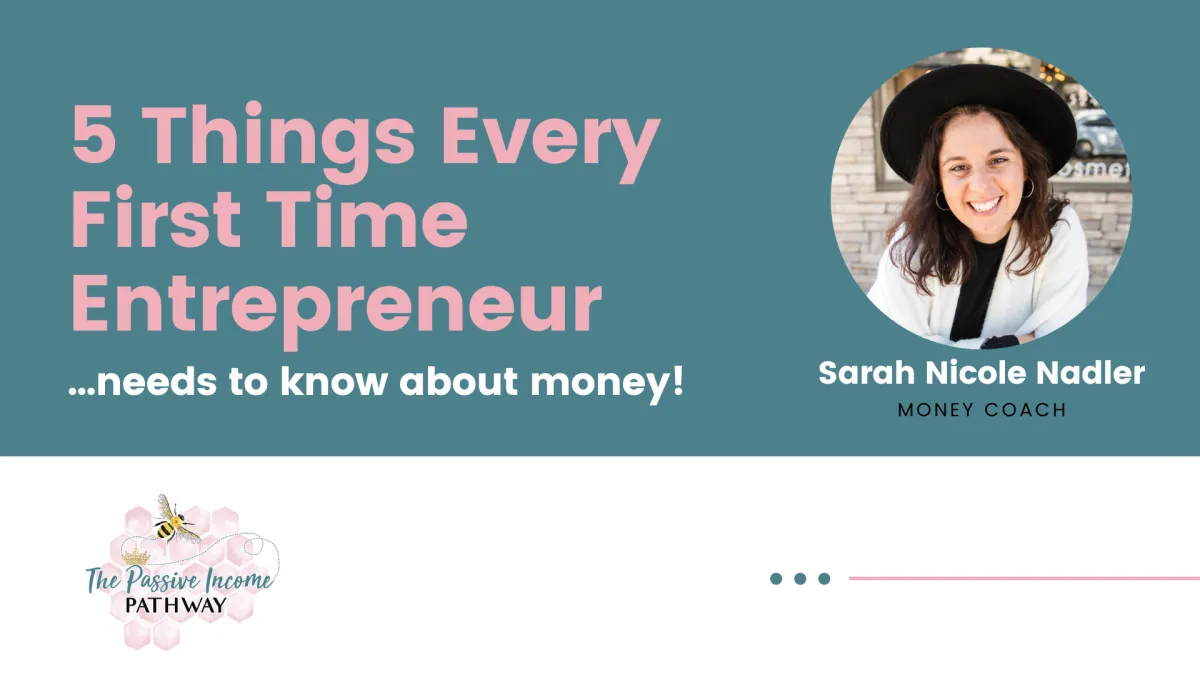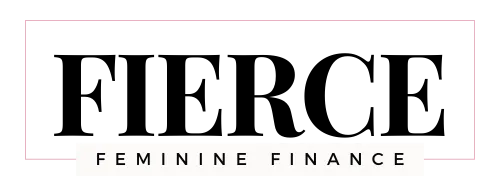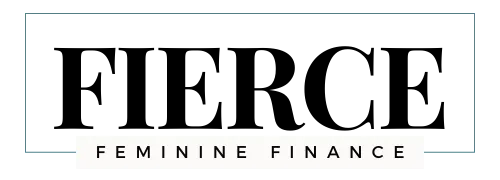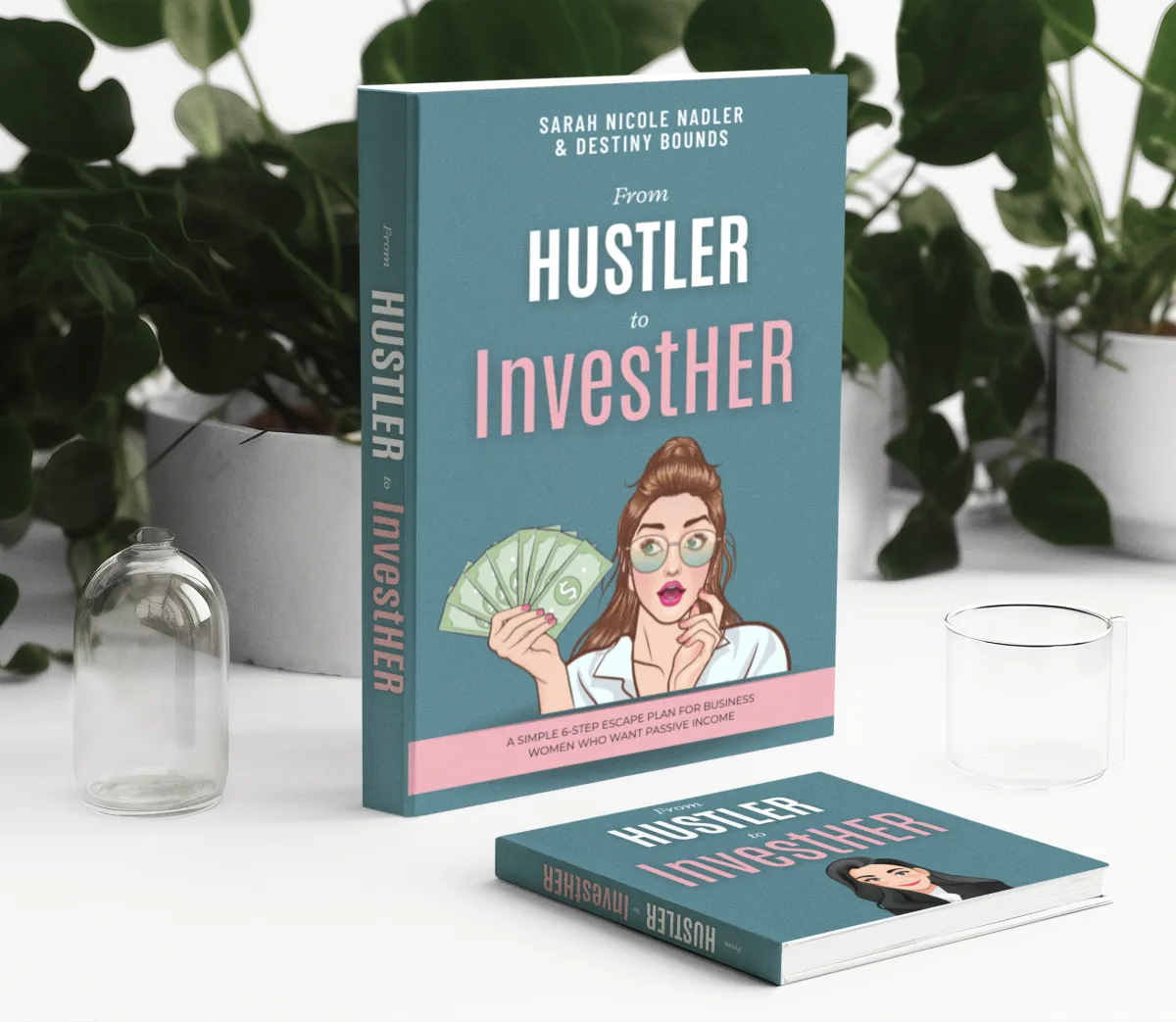
5 Things Every First Time Business Owner Needs To Know About Money
“Preventing the problem is always cheaper than fixing it once its 'broke'.” - Sarah Nicole Nadler
If you're just starting your first business, I know there are a million things pulling for your attention and time. Learning about financial principles like compound interest and investing might seem like putting the cart before the horse if you're just starting out!
But the truth is, the more financially literate you are, the more mistakes you can avoid from the beginning...and the faster you'll be able to become financially free.
I built my first full-time business when I was 18, and sold it just a year later for enough cash that I was able to travel and live off my savings for nearly ten years.
So this week on Fierce Feminine Finance I'm sharing with you the mistakes I made as an entrepreneur when I built my first business, and the top five things I think every first time business owner needs to know about money.
With every episode of Fierce Feminine Finance, I like to empower you with a POWERFUL free resource that goes with the episode which you can implement right away to create some of the same results, if not better, in your business.

This week, since we are talking about the most important things for a female entrepreneur to know about money, I put together an Ultimate Guide To Becoming Financially Bulletproof so you know the best questions to ask your financial advisor.
After going through this freebie you will be able to identify what is working (and what isn't) in your financial plan right now. So you can take things to the next level!
You can download it right away by clicking here or on the photo above 👆
With that said, here are the 5 things every first time business owner should know about money! 👊
1. Business Budgeting Is Completely Different Than Personal Budgeting (...And Just As Vital)
There are several very important differences between managing your personal finances, and managing the finances of a business.
When you shop as a mom or household... you're buying things to consume them.
Utilities and food, once consumed are gone forever and to obtain their benefits again, we need to re-purchase them. A car, whilst it will provide us with a benefit long term, is also consumed over time and needs to be replaced. Even a home we have purchased – when we extract more value than a roof over our heads, at some point the value we obtain will lose its luster and we may want to replace it.
Household finances are therefore a consumption based model.
Business finances are a cash-generating model.
The Financial System of your business exists to help you keep income higher than your expenses, and make it possible to achieve the basic purpose of the business.
You give every dollar a "job" based on what you think is the best use of business funds, and then go back and compare your plan with reality to see how you did.
An entrepreneur who isn't assigning a "job" to every dollar at the beginning of each month, and then comparing their plan with reality at the end of the month is missing a key piece of the Financial System.
So long as marketing and sales are easy, this may not matter. But the moment a recession hits, sales falter, or the market changes...suddenly the business owner finds they are spending more than they make and will struggle to be profitable.
To do a business budget properly requires three basic steps:
- Income Planning (to even out cash flow)
- Statistic Analysis (to predict future internal number trends)
- Cost Analysis (to make sure expenses are bringing IN more money than they are costing you)
...only with those done can you properly create a business budget.
Here is an example of me creating a budgeting for a $7-figure business the RIGHT way!
2. Proper Planning Prevents Piss Poor Performance (...Especially During A Disaster)
Most people avoid thinking about the worst case scenario. And that's probably good for your mental health! But not so great for your financial plan.
Disaster preparedness is a critical aspect of protecting your financial future as a business woman. The emergency you never saw coming (and didn't plan for) will always hit harder economically than the scenario you're fully prepared to have happen!
My dad owns a disaster restoration business and growing up I saw how devastating it can be, emotionally and financially, when a family isn't prepared.
The first step is conducting a thorough assessment of the potential risks your business may face. This involves evaluating your location, industry, and the specific nature of your business. Consider factors such as geographical vulnerabilities (e.g., earthquakes, floods), industry-related risks (e.g., cyber attacks for tech businesses), and other potential threats.

Once you've identified the most likely disasters you or your business are at risk for, the next step is to come up with a plan so you're as prepared as possible (without turning into a crazy prepper stashing 1,000 bags of cornflakes in a bunker!).
A good Disaster Plan has two component parts:
Logistical Preparedness
This includes establishing evacuation procedures, securing important documents and data, and setting up off-site backup systems for critical information. Consider the logistics of maintaining business operations during and after a disaster, such as remote work capabilities and alternative suppliers.
Financial Preparedness
Obtain the appropriate insurance coverage for potential risks, such as property insurance, business interruption insurance, and cyber insurance. Ensure that your coverage adequately addresses the specific threats your business may encounter.
Regularly review and update your insurance policies to reflect changes in your business operations. Create an Emergency Fund to cover immediate expenses, such as repairs, temporary relocation, or operational disruptions.

3. Debt Is Only Bad If The Annual Interest Exceeds Your Returns
Effectively managing debt and building business credit are an important part of "adulting" in the US today. But many women who come to me for money coaching as they start their first business, are obsessed with living a "debt-free" lifestyle...and it causes them to miss opportunities to scale quickly and purchase investments that might make them wealthy.
A better approach is to use a Sacred Account to earn interest on your debt instead of letting it cost you and use it to find outside sources of funding so you can build wealth much more quickly.
Avoiding high-interest debt (such as credit cards) and consumer debt (when eating out, on vacation, or to buy your own home) is not the same thing as going 100% debt-free!
Some examples of a potentially "good" use of debt would be:
Taking out a mortgage or low-interest loan to purchase a cash-flowing real estate investment
Offering investors low-interest terms to raise seed money for a startup
Student loans for a degree in a regulated industry (doctor, lawyer, finance, etc) where work experience isn't enough to get you started
4. A Lady Never Leaves Her Shield Behind When She Rides Into Battle (P.S. - Legal Is Your Shield)
Okay, probably I read one too many Sarah J. Maas novels to come up with that title, but it's true: what is a Viking Shieldmaiden without her shield??!
Same goes for a business woman. Going into business without a property legal entity (LLC, Corp, etc), letting clients hire you without signing contracts or agreeing to terms & conditions; putting up a website without a privacy policy...
Ah! Yep I've got mine. I know you checked below, didn't you ;-)
...all these and more are the many various ways a good business attorney can protect you!
My personal favorite legal resource is The Legal-fluence Lounge by my dear friend Destiny Bounds. (Check her out and if you want to support my blog, let her know I sent you and she'll send me a small finders fee)
In my mind, legal is a lot like medicine: you can pay a few hundred bucks to get your teeth cleaned often...or you can pay a few thousand later to replace them! Preventing the problem is often cheaper than fixing it once it "broke".
5. Retirement Works Differently For Business Owners & Entrepreneurs
There are 5 ways a business can become a part of your overall plan for financial freedom. I went in depth on this topic in Episode 84 so I highly recommend you check that out.
But before I explain each of these five strategies, you have to realize the formula for how much an average person needs in order to retire is typically based on the amount of income they would need to replace when they are no longer working at a J.O.B...
That retirement planning model is the generally accepted practice right amongst the financial advisor community, and it's distributed to the general population, but it's not the best one for business owners.
Firstly, a lot of the traditional savings vehicles don't make sense, right?
You don't have a 401(k), or if you do there's no one else matching it!
So rather than looking at how much you want to save for retirement exclusively as an exit plan...
...instead of asking, "How much do I need to save", I want you to ask yourself, "how much passive income do I want to have in retirement?"
I call this your Freedom Number:

To calculate your Freedom Number, start by journaling on this question: "If I had all the time in the world, and the complete support of my family and friends...what would I be spending my days doing if I didn't have to trade time for money?"
Once you have figured out your Ideal Day, the next step is to simply calculate how much monthly passive income you would need in order to lead that lifestyle.
Okay, now that you know your Freedom Number, let's take another look at how your business can help you get there.
There are 5 ways for a business owner to retire. Three of them involve selling the business, another is to make the business "boring" by building a team and hire a CEO to manage them (so you become like Warren Buffett or Codie Sanchez -- owning many businesses but running NONE of them!). The last one is my favorite...so I wrote a separate blog with pros and cons for each.
In Summary
I hope you found this episode helpful!
Once you are ready to put a complete financial strategy in place, you will need a money coach to help you design the best passive income roadmap for you and your business.
I can help.
A Beginner-Friendly Class On Investing & Building Passive Income for Business Women and Entrepreneurs
Get my exclusive strategy for turning your intellectual property into passive income and growing it to 5-figures per month and beyond! FREE


© Copyright 2024 Sarah Nicole Nadler LLC. All rights reserved.
2022 All Rights Reserved.



